"A musical notation is a language which determines what you can say;
what you want to say determines your language." [Cornelius Cardew 1961]
what you want to say determines your language." [Cornelius Cardew 1961]
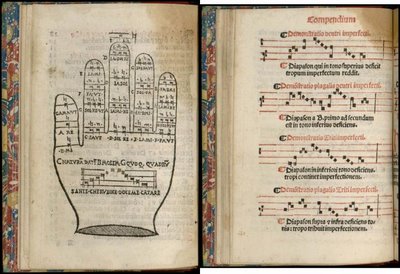 'Cantorinus ad Eorum Instructionem' Luce Antonii Junte, 1540.
'Cantorinus ad Eorum Instructionem' Luce Antonii Junte, 1540.*I think* that the image of the hand was meant as a mnemonic device to be used
in staggered singing of hymns so as to remember the allowed notes...or something.
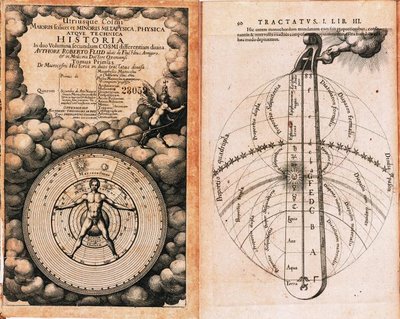 "Robert Fludd (1574-1637). Opera, [Francofurti : Goudae], Oppenhemii,
"Robert Fludd (1574-1637). Opera, [Francofurti : Goudae], Oppenhemii,J. Th. de Bry et haeredes, C. F. et G. Fitzer, P. Pammazenius, 1617-1638."
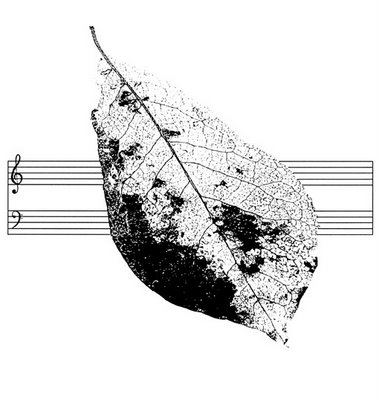 Randy Raine-Reusch 'Leaves 2' 1993.
Randy Raine-Reusch 'Leaves 2' 1993."This score can be performed aurally, visually, kinesthetically,
synesthetically, interactively, literally, symbolically, or philosophically."
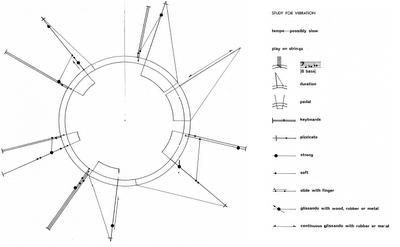 Toru Takemitsu 1962 'Study for Vibration' (from 'Corona for Pianists').
Toru Takemitsu 1962 'Study for Vibration' (from 'Corona for Pianists')."The performance may start at any point of the perimeter no matter clockwise or counterclockwise." [nb. There's a chance this was mislabelled and is actually by Sylvano Bussotti]
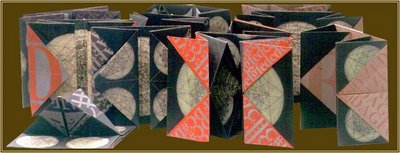
[A literary use or response to the fugue can be found in Joyce's 11th episode in Ulysses ('Sirens') in which the wording and chapter structure attempted - with some poetic license - to mimic or work within the rules of the fugue. Unsurprisingly, a quick search on 'Sirens' revealed that John Cage, a leading musical experimentalist and graphic score 'artist' names James Joyce as an influence. See: 'James Joyce and Avant Garde Music' © Scott W. Klein 2004 at the Contemporary Music Centre.]
This post had been left on the backburner for many months. Graphical scores are a modernist trend so of course copyright and commercial interests means that there are not as many examples online as I had otherwise hoped.
- Wikipedia has a very basic introduction to experimental music.
- The Block Museum's 'Pictures of Music' exhibition at Northwesten University in Illinois has a great presentation about the history and exponents of graphical scores. Alas, all the links to large images are dead, as they were months ago when I first checked out the site.
- The first 3 images above come from a wonderful exhibition in french at La Bibliothèque de Toulouse (click on 'expos virtuelle') - 'Entre les lignes de la portée : quand la musique se donne à voir' - something like: 'Between the lines of the range: when the music is seen.' Lots of rare music book images and music samples.
- A Young Person's Guide to 'Treatise' - Cornelius Cardew.
- Score gallery at a Japanese site.
- Barry Guy graphical scores at Maya Recordings.
- The Experimental Music Catalogue (including the Journal of Experimental Music).
- The official George Crumb homepage.
- The New Music Box on George Crumb - pdf scores at the bottom of the page.
- 'A Performer Drawn to the Piano's Wild Side' [New York Times] : Why Margaret Leng Tan has 16 toy pianos and three Steinways in her Brooklyn apartment.
- Karlheinz Stockhausen homepage. (googleimages)
- Graphic scores by Randy Raine-Reusch at Asza.
- Kerry John Andrews graphic scores at the Digital Art Museum.
- John Kannenburg graphic scores.
- The final image above comes from the See Music Project - we have finally worked out the loading glitch (truncated URL). It's a flash program that definitely requires a high speed connection and is well worth a look.
- What does music look like? The Shape of Song.
- 'The Art of Fugue' bookart by Elizabeth Harington.
Many thanks variously for known and unknown assistance to Panopticist, Waggish, Giornale Nuovo, Languagehat and Boynton.
Some of the links will play music. As always, click the above images for larger versions.
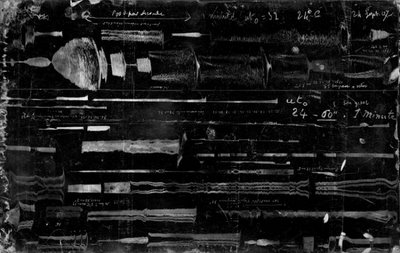


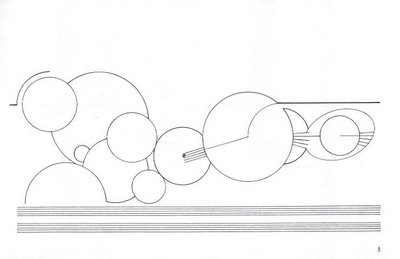
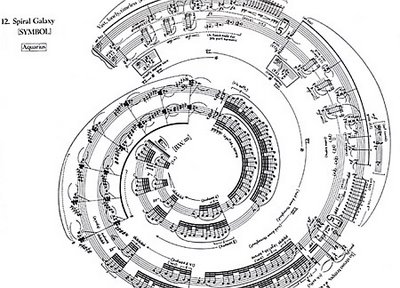
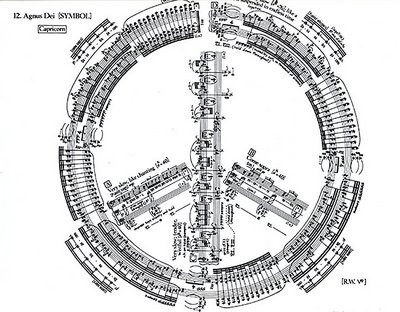
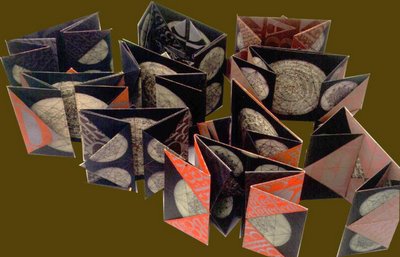

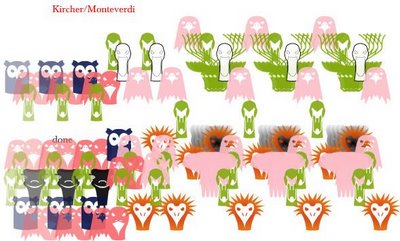
Delightful. I have blogged it here:
ReplyDeleteBibliOdyssey: More musical notation.
This is beautiful stuff, & thoughtfully put together: many thanks!
ReplyDeleteWhat a wonderful fascinating site you have here. I'm adding you to my list of links.
ReplyDeleteomg, i found this great site, i was crawling bout Codex Seraphinianus, and ended up here somewhere ^^
ReplyDeletegreat site ^^
gotta bookmark this :)
great post. I used to find the notation of John Cage fascinating.
ReplyDeleteI didn't know there was so musch more.
Thanks all.
ReplyDeleteCheers Sam. Guidonian Hand and solfege. That is far out there beyond my mortal, non-musical understanding. I am happy to comprehend it as a mnemonic device for music ;-)
What a fantastic post... I humbly link to it...
ReplyDeleteIf you can find Cornelius Cardew's "Scratch Music" book, there are lots of lovely graphic/conceptual musical scores in there too...
great post, you might be interested in this graphical score:
ReplyDeletehttp://at.or.at/hans/solitude/
great post, you also may be interested in this graphical score: http://filosonia.110mb.com/TRANSTORNOPartitura.pdf
ReplyDeleteWow. Thank you very much. That is fabulous. I don't quite know how to read or untangle it (them) but I very much appreciate works that travel out to the edge of their sandbox.
ReplyDeleteObrigado por compartilhar essas peças :-)
Bravo! I didn't imagine a thing like this. I didn't know could exsist another way to represent music. Thanks
ReplyDelete